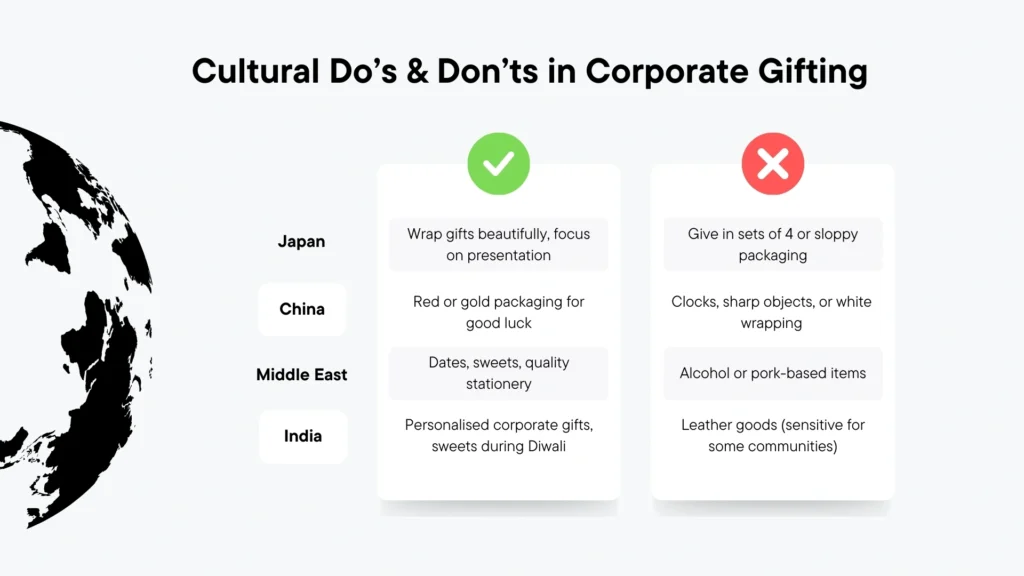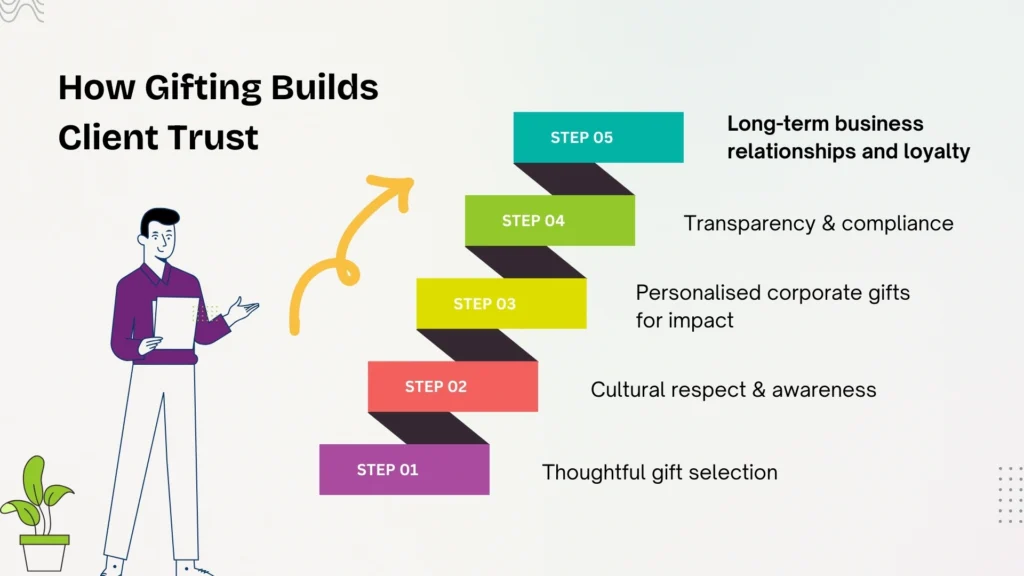Corporate gifting has always been a subtle but powerful way to nurture business relationships, strengthen client trust, and show appreciation across borders. However, in the current globalized economy what seems like a kind act in one nation may amount to a blunder in another. When companies conduct business across borders they should do more than just select corporate gifts to offer to clients, they should be in line with legal systems, culture, sustainability demands, and ethics.
This blog explores the cultural do’s and don’ts of corporate gifting for international clients, while also addressing overlooked areas such as inclusivity, tax implications, digital gifting, and real-world risk scenarios.
Why Corporate Gifting Matters in Global Business
To multinational organizations, gifting is not an act of charity. Thought-out gift such as high-quality corporate gifts or well-chosen corporate gift boxes may mean respect, appreciation, and a long-term purpose. When done right, gifting can enhance engagement, strengthens loyalty, and makes a brand stand out.
However, without a clear corporate gift policy international clients may misinterpret gifts as bribery or favoritism When they occur in a regulated industry, a gift in excess of a small token may even be illegal under the anti-bribery laws. As such, there should be a middle-ground between giving client appreciation gifts and compliance.
Do: Understand Cultural Context
Respecting cultural norms is one of the earliest regulations of gift giving internationally. For instance:

- In Japan, presentation and packaging are just as important as the gift itself. Choosing beautifully designed corporate gift kits signals thoughtfulness.
- In China, avoid clocks or items in sets of four, as they symbolize bad luck. Opt for personalised corporate gifts that carry meaning instead.
- In the Middle East, refrain from gifting alcohol unless you are certain it is culturally acceptable. Food hampers or sustainable corporate gifting alternatives are safer.
Corporate gifting firms usually offer local knowledge in order to be culturally aware. A partner who is cognizant can assist you towards expensive bloopers.
Don’t: Ignore Legal & Compliance Boundaries
Most professionals are led to believe that as long as the gift is given in goodwill it would be accepted. However, there are strict anti-bribery laws enforced in countries such as the U.S. and the U.K. and other sectors such as the healthcare and financial may have even higher thresholds.
Organizations should implement a clear corporate gift policy that international clients must follow. This is especially important when dealing with corporate gifts for clients and even more so when offering corporate gifts for international clients, where cultural differences and compliance requirements vary widely.

- Acceptable gift value limits.
- Circumstances under which gifts require disclosure.
- Procedures for group vs. individual gifting.
- Processes for recording and approving gifts.
Employees should be trained into knowing the difference between a true client appreciation gift and gifts which might be seen as trying-to-influence.
Do: Embrace Sustainability and Ethics
Ethical responsibility is important to the clients today. More organizations are opting to use sustainable corporate gifting options- reusable bottles, organic cotton goods, or even corporate gifts made of recycled materials- to show their social and environmental commitments.
This is especially important in markets like corporate gifts India, where sustainability is emerging as a competitive differentiator. Brands that align with global CSR expectations reinforce client trust and enhance reputational value.
Beyond sustainability, ethical sourcing matters. Avoid products linked to exploitative labor or environmental harm. Transparency in the supply chain ensures gifts represent integrity, not just generosity.
Don’t: Assume One Gift Fits All
The clients cannot be equalized by culture only but also by a way of living which defines lifestyle, eating habits, and values. A box labeled as a “standard” gift can be a complete flop- or, even worse, can make an awkward situation. Think of the scenario whereby you ship a gourmet meat hamper to a vegetarian client in India.
Instead, focus on customization:
- Personalised corporate gifts tailored with names, initials, or regional motifs.
- Curated corporate gift kits that match client lifestyles.
- Experience-based gifting such as wellness retreats, online workshops, or VIP access to events.
These alternatives are sensitive and they avoid the dangers of cultural insensitivity.
Do: Consider Inclusivity
This is one aspect that is not usually noticed. Inclusion implies such gifts are thoughtful gender wise, religion wise, accessibility wise, and diet wise. Some best practices include:
- Offering a range of corporate gifting ideas so clients can select their preference.
- Choosing neutral designs and avoiding gifts tied to specific religious symbolism unless appropriate.
- Ensuring packaging is accessible and not wasteful.
Inclusivity sends the message of respect and helps build business relationships based on equality rather than on an assumption.
Don’t: Forget Tax & Accounting Implications
Although the cultural and adherence arguments are always focal in most discussions on ethics of gifting, an aspect that is always overlooked, especially practically, is tax treatment. Various jurisdictions have different requirements regarding deductibility, reporting threshold and disclosure.
For example:
- In the U.S., business gift deductions are capped at $25 per recipient per year.
- In India, certain corporate gifts India may be taxable to the recipient, depending on value.
- In the U.K., trivial benefits are exempt, but lavish gifts may be taxable.
It is important that companies collaborate with finance departments to make sure that their corporate gift policy welcomes international clients considers not only ethical, but also tax-related considerations.
Do: Explore Digital and Virtual Gifting
Digital alternatives have come out as empowering options especially in the era of hybrid work. Online event tickets, membership to streaming services or online gifts to clients such as e-gift cards can easily cross borders.
However, ethical gifting in the digital world also requires attention:
- Ensure data privacy when collecting client details for digital platforms.
- Avoid excessive monetary values that could be misinterpreted.
- Opt for platforms aligned with company policies.
Online gifts open the door to more opportunities with less hindrances associated with cross border gift giving.
Don’t: Overlook Risk Scenarios
Even with the best intentions, gifting can go wrong. Case examples include:
- A multinational sending alcohol hampers to clients in countries where alcohol is prohibited.
- Lavish premium corporate gifts that created internal investigations due to perceived favoritism.
- An untracked gifting campaign leading to conflicts of interest.
Foresight is always present in risk management: any gift, whether of a corporate gift box or the gifting of an experience in the form of a gifting voucher, ought to be screened with respect to potential reputational risk.
Do: Use Gifting as a Strategic Relationship Tool
By being done in cooperation with strategy, gifting biological becomes more than being a courtesy, it becomes a differentiator. A well-chosen corporate gift kit or personalised corporate gift can:
- Reinforce brand values.
- Show appreciation beyond transactions.
- Mark milestones, anniversaries, or cultural festivals.
In the case of international settings, time is also of importance. Cultural empathy can be demonstrated with a local holiday like Diwali in India, Lunar New Year in China and Thanksgiving in the U.S. by sending a gift to the client.
Don’t: Treat Gifting as a Standalone Gesture
Relationship-building should have gifting as a supplement rather than a substitute. A meaningful business gift to the customers and a personalized correspondence exceeds by far a plain set of gifts.
Incorporating client engagement strategies involving gifting is important as the gift will strengthen the business relationships and maintain faith on a business relationship with time.
Do: Balance Innovation and Tradition
Although there will always be value in traditional tokens, there is more and more value in something new and special being addedFor instance:
- Combining sustainable corporate gifting with modern design.
- Blending physical corporate gift boxes with digital vouchers.
- Offering wellness-centered experience-based gifting that aligns with global health trends.
Continuing innovations in gifting ensures that it is still relevant as well as makes the organization appear modern.
Don’t: Underestimate Presentation
Even the most chosen present may lose its sense when it is presented in an unsuccessful way. The packaging speaks of respect In other markets such as Japan and India, the perceived value is increased by well packaged corporate gifts in kits.
Incorporate eco-friendly packaging to go with environmentally-friendly corporate gifting. As discreetly as possible, take advantage of company branding on gifts so they are not just points of marketing manipulation but genuine displays.
Do: Learn from Feedback

After gifting campaigns, gather feedback to measure impact. Did the gift enhance client trust? Was it seen as culturally appropriate? Did it strengthen business relationships?
Monitoring this assists in sharpening of the next corporate gifting ideas and makes investments in the enterprise productive in terms of relationships. With time, gifting will be converted into strategic tool through feedbacks centered approach.
FAQ’s
Cultural norms influence how gifts are received. A well-intentioned corporate gift for clients may be seen as inappropriate in another culture, making awareness essential.
Safe options include sustainable corporate gifting items, personalised corporate gifts, neutral stationery, eco-friendly drinkware, or experience-based gifting like event passes.
Yes. Countries enforce anti-bribery and compliance rules. A clear corporate gift policy international clients helps avoid legal issues and ensures ethical practices.
Premium corporate gifts like leather organizers, luxury pens, branded tech gadgets, or curated corporate gift kits are often appreciated across markets.
Well-chosen client appreciation gifts reinforce gratitude, celebrate milestones, and support long-term business relationships with international partners.




















